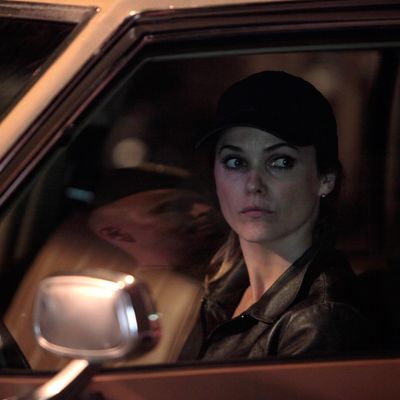
You should take this review’s brevity as a compliment to The Americans, the new spy drama that debuts on FX tonight. I didn’t know anything about it going in, other than the basic plot — two KGB spies pose as a married couple in early-eighties Washington, D.C. — and I’m glad I didn’t, because more so than most pilots, this one is driven mainly by surprise and reversal of fortune, and I’d like to preserve those qualities. Plus, I’ve decided to recap the show weekly for Vulture. So yeah, I like it. A lot.
Joe Weisberg, creator of The Americans, worked at the CIA for four years in the early nineties. There are just enough real-world spycraft details woven into the action to sell the show’s more ludicrous conceits, chiefly that the former Soviet Union would breed certain men and women from adolescence onward to pass for Americans, then plant them among us to wreak havoc. But make no mistake: This is a dark fantasy, not just of espionage but of domestic life; it operates as much by dream logic as actual logic, placing its main characters — married spies-assassins-seducers Elizabeth and Phillip Jennings (Keri Russell and Matthew Rhys) — in suspenseful situations, then having them switch gears and deal with the house or the kids.
Like the plot of Fox’s The Following, a thriller about a serial killer raising a secret army of other serial killers, the conception of the Jennings’ mission evokes the hysteria over Al Qaeda sleeper cells a decade ago as well as the plots of zombie and body-snatcher movies: Anyone could be one of THEM! And yet The Americans is also a domestic drama — sometimes a dry domestic comedy, verging on an exceptionally brutal sitcom. The pilot revolves around what to do with a kidnapped KGB agent being held in the trunk of a car in the Jennings’ garage; the abductee is part of a failed mission, and as it turns out, he’s responsible for a teenage trauma that Elizabeth has been carrying around inside her for two decades and can’t wait to exorcise, preferably on the bastard’s smug face. There are also tense, related scenes involving the Jennings’ new neighbor, FBI agent Stan Beeman (the incomparable Noah Emmerich), who moves in down the block and thinks Philip is a nice guy, if a bit odd. The relationship between Beeman and the spies evokes Hank’s always-a-step-behind relationship with the Whites on Breaking Bad, but the unstable three-way chemistry among Emmerich, Rhys, and Russell elevates it beyond a mere trope and makes it specific and often very funny. That Beeman is essentially the Nosy Neighbor from an old sitcom as well as a badge-and-gun-packing G-man adds comedy to the tension.
The show’s emphasis on the spies’ emotional lives and its grounding in historical fact dampens the paranoia and turns the show into more of a character study of people under extreme duress. Phillip seems like a warm fellow, empathetic and talkative and active; because he likes life in the U.S., he wavers in his mission to undermine and destroy it. Elizabeth is a cooler character, remote at times, but with a ferocious anger roiling beneath her porcelain façade. She’s unswervingly loyal to the USSR, finds America and its capitalist values repulsive, and has to restrain herself from correcting the kids whenever they regurgitate anti-Soviet propaganda fed to them by U.S. textbooks. As played by Rhys and Russell, both of whom are terrifically alert and subtle, the Jennings’ marital dynamic is fascinating. He’s a lot colder than he initially appears, and she’s more vulnerable. They seem to complete each other in ways neither of them could probably articulate. When the spies sleep with other people to get information (as Elizabeth does in the pilot’s opening scene and as Philip does in next week’s episode), you question the characters’ ability to compartmentalize their feelings and morals — as do they. They frame their affairs as part of the job. (What’s with the F-me pumps, honey? Working late again?) But they sell their performances (in both senses of the word) so enthusiastically that you have to wonder.
The Americans is far from perfect. The opening action sequence, set to Fleetwood Mac’s “Tusk,” is too calculating and ultimately a bit tedious — it feels like the opening of a pretty-good CBS crime show — and you’re always aware that this is a cable drama trying very, very hard to be a cable drama. The show’s premise borrows from Breaking Bad, Homeland, and The Sopranos (criminality hiding behind suburban “normalcy”) as well as Mad Men (period music, clothes, and production design; frequent nods to then-current events; imposter heroes). And yet the sum feels original. The pilot’s climactic set piece is cheesy, dumb, and perverse, and also deeply romantic and sexy as hell, and musically bold, taking a pop hit that’s been stamped “Property of Miami Vice” since 1984 and scrawling a Cyrillic signature on it.
The Americans might take a while to find its footing — most shows do; but it already has a personality, a pulse of life. I have no idea how long it can sustain its premise without seeming repetitious, but for now, I’m hooked. If you want to monitor the ebb and flow of my latest TV crush, check Vulture’s recaps page every Thursday morning for the next ten weeks. Dasvidania for now, comrade.


